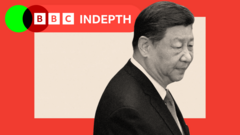China's economic future hangs in the balance as President Xi Jinping confronts a plethora of challenges exacerbated by former President Donald Trump's tariffs. While many Chinese traders chuckle at the mention of Trump's 145% tariffs, they are not without concerns. A rise of online nationalism has seen a barrage of memes mocking the US leadership, all while Xi maintains a confident stance on China's self-reliance in the face of economic adversities.
Though his confidence stems from reduced reliance on US exports, Xi's challenges run deeper. The country grapples with a housing crisis leading to plummeting consumer spending as many families face financial insecurity after investing in now-worthless properties. With speculation that vacancy rates can accommodate over three billion people, Xi's dream of a prosperous domestic market looks increasingly unattainable.
Job security is another looming issue with youth unemployment reaching above 20%, while the government's pension fund risks running dry by 2035, leaving an aging population in uncertainty. The shift to prioritizing domestic demand poses a long-term adjustment, with the likelihood of a significant short-term boost in spending looking slim.
The political landscape is equally daunting for Xi, who must address the discontent of a generation worried about their economic future to prevent potential unrest. Despite China's strides in tech innovation, including major advancements in consumer electronics and electric vehicles, Xi faces mounting external pressures from continuing tariff measures that threaten these gains.
To chart a path to success, Xi hopes to transform challenges into opportunities. While current measures are unlikely to yield quick results, government initiatives aim to support consumer spending. Additionally, diversifying export markets beyond the US can strengthen China's economy.
All eyes are on whether Xi can navigate these domestic and international pressures effectively. The stakes for China's leadership—and its citizens—couldn't be higher as they enter a period of economic transition under scrutiny from inside and outside its borders.




















